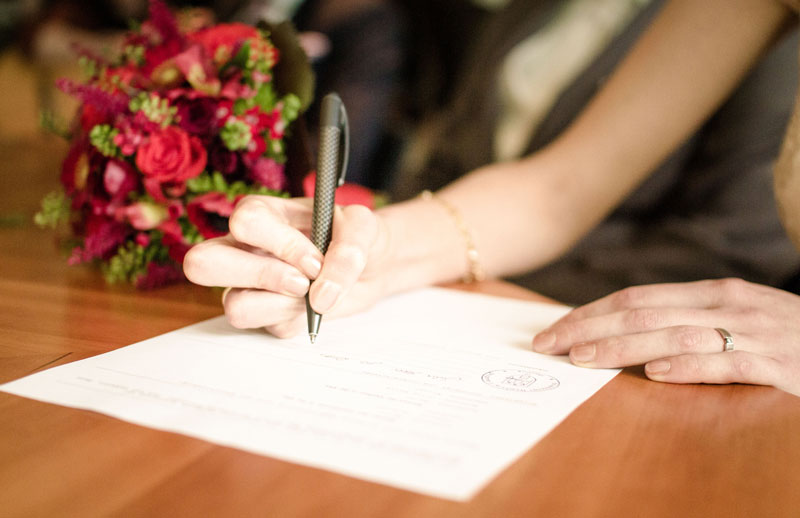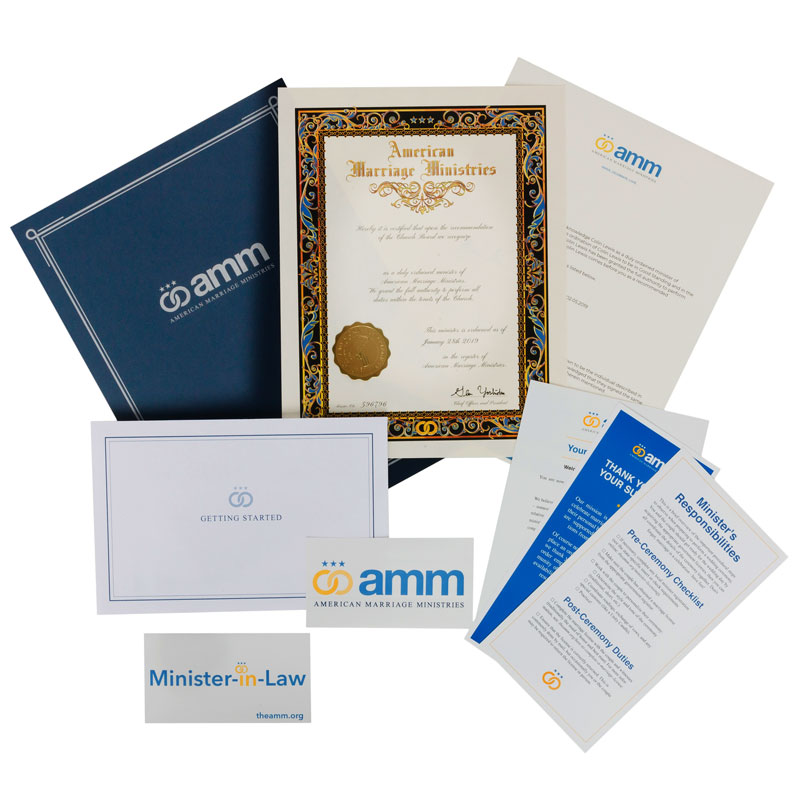Become a Tennessee Wedding Officiant with ourFree Online Ordination
If you are considering getting ordained online to officiate weddings in Tennessee, then you have come to the right place. The first thing you should know is that it is 100% legal for you to get ordained online in Tennessee to officiate weddings. Keep reading to learn more about why online ordinations are legal in Tennessee and how you can get ordained to officiate weddings anywhere in the State.
5 Tennessee Online Ordination Facts
Who can perform marriage in Tennessee?
” (a) (1) All regular ministers, preachers, pastors, priests, rabbis and other spiritual leaders of every religious belief, more than eighteen (18) years of age, having the care of souls, and all members of the county legislative bodies, county mayors, judges, chancellors, former chancellors and former judges of this state, former county executives or county mayors of this state, former members of quarterly county courts or county commissions, the governor, the speaker of the senate and former speakers of the senate, the speaker of the house of representatives and former speakers of the house of representatives, the county clerk of each county and the mayor of any municipality in the state may solemnize the rite of matrimony. ”
Tennessee Code § 36-3-301
Does the Tennessee government recognize online ordained ministers?
Yes. As clearly stated in the State Law, ministers that were ordained online are no different than ministers ordained by any other means, be it in-person, or through years of seminary study. Ordained means ordained. Period. Get Ordained Now
Are wedding officiants required to register with the Tennessee Government?
This may come as a surprise to you, but wedding officiants in Tennessee do not have to register with any government office before or after officiating wedding ceremonies. There are no laws in Tennessee requiring that officiants register with any government office and there is no government office charged with such a responsibility.
What Tennessee government office must the officiant contact before performing marriage?
None. The Tennessee government does not have any office that registers, certifies, or licenses wedding officiants. Simply put, at no point in your journey from ordination to officiating are you required to contact or register with any Tennessee government office.
What is the minimum age allowed for a wedding officiant in Tennessee?
In Tennessee all wedding officiants must be at least 18 years old to be able to legally solemnize marriage. Basically, in addition to being an ordained minister, you must also be a legal adult.
How Are Tennessee Online Ordinations Legal?

To better understand the legal underpinnings of how online ordinations work in relation to gaining the authority to officiate weddings in Tennessee, it is helpful to familiarize yourself with an esoteric legal term, “Solemnization of Marriage”. Solemnization of Marriage is simply a fancy way of saying, “Perform Marriage”, “Conduct a Wedding”, or “Officiate a Wedding”. Solemnize is the official act of conducting a wedding ceremony. This is how the act of performing a wedding ceremony is described in the Tennessee Code. Below is the law that specifies who exactly can Solemnize Marriage in Tennessee:
Tennessee Code § 36-3-301
(a) (1) All regular ministers, preachers, pastors, priests, rabbis and other spiritual leaders of every religious belief, more than eighteen (18) years of age, having the care of souls, and all members of the county legislative bodies, county mayors, judges, chancellors, former chancellors and former judges of this state, former county executives or county mayors of this state, former members of quarterly county courts or county commissions, the governor, the speaker of the senate and former speakers of the senate, the speaker of the house of representatives and former speakers of the house of representatives, members of the general assembly who have filed notice pursuant to subsection (l), law enforcement chaplains duly appointed by the heads of authorized state and local law enforcement agencies, members of the legislative body of any municipality in this state, the county clerk of each county, former county clerks of this state who occupied the office of county clerk on or after July 1, 2014, and the mayor of any municipality in the state may solemnize the rite of matrimony. For the purposes of this section, the several judges of the United States courts, including United States magistrates, United States bankruptcy judges, and federal administrative law judges, who are citizens of Tennessee are deemed to be judges of this state. The amendments to this section by Acts 1987, ch. 336, which applied provisions of this section to certain former judges, do not apply to any judge who has been convicted of a felony or who has been removed from office. (2) In order to solemnize the rite of matrimony, any such minister, preacher, pastor, priest, rabbi or other spiritual leader must be ordained or otherwise designated in conformity with the customs of a church, temple or other religious group or organization; and such customs must provide for such ordination or designation by a considered, deliberate, and responsible act. Persons receiving online ordinations may not solemnize the rite of matrimony. (3) If a marriage has been entered into by license issued pursuant to this chapter at which any minister officiated before July 1, 2019, the marriage must not be invalid because the requirements of the preceding subdivision (a)(2) have not been met. (b) The traditional marriage rite of the Religious Society of Friends (Quakers), whereby the parties simply pledge their vows one to another in the presence of the congregation, constitutes an equally effective solemnization. (c) Any gratuity received by a county mayor, county clerk, members of the county legislative body, or municipal mayor for the solemnization of a marriage, whether performed during or after such person’s regular working hours, shall be retained by such person as personal remuneration for such services, in addition to any other sources of compensation such person might receive, and such gratuity shall not be paid into the county general fund or the treasury of such municipality. (d) If any marriage has been entered into by license regularly issued at which a county mayor officiated prior to April 24, 1981, such marriage shall be valid and is hereby declared to be in full compliance with the laws of this state. (e) For the purposes of this section, “retired judges of this state” is construed to include persons who served as judges of any municipal or county court in any county that has adopted a metropolitan form of government and persons who served as county judges (judges of the quarterly county court) prior to the 1978 constitutional amendments. (f) If any marriage has been entered into by license regularly issued at which a retired judge of this state officiated prior to April 13, 1984, such marriage shall be valid and is hereby declared to be in full compliance with the laws of this state. (g) If any marriage has been entered into by license issued pursuant to this chapter at which a judicial commissioner officiated prior to March 28, 1991, such marriage is valid and is declared to be in full compliance with the laws of this state. (h) The judge of the general sessions court of any county, and any former judge of any general sessions court, may solemnize the rite of matrimony in any county of this state. Any marriage performed by any judge of the general sessions court in any county of this state before March 16, 1994, shall be valid and declared to be in full compliance with the laws of this state. (i) All elected officials and former officials, who are authorized to solemnize the rite of matrimony pursuant to subsection (a), may solemnize the rite of matrimony in any county of this state. (j) If any marriage has been entered into by license issued pursuant to this chapter at which a county mayor officiated outside such mayor’s county prior to May 29, 1997, such marriage is valid and is declared to be in full compliance with the laws of this state. (k) The judge of the municipal court of any municipality, whether elected or appointed, shall have the authority to solemnize the rite of matrimony in any county of the state. (l) In order to solemnize the rite of matrimony pursuant to subdivision (a)(1), a member of the general assembly must first opt in by filing notice of the member’s intention to solemnize the rite of matrimony with the office of vital records.
Tennessee Code § 36-3-301 Explained
If this law looks like an indecipherable wall of text, don’t worry. Let’s focus in on the part that is relevant to you.
“(a) (1) All regular ministers, preachers, pastors, priests, rabbis and other spiritual leaders of every religious belief, more than eighteen (18) years of age, having the care of souls… may solemnize the rite of matrimony.”
This law allows for people of any religious faith to self actualize their ability to officiate wedding ceremonies. Beyond being articulated in the Tennessee Code, this right is also enshrined in the 1st amendment of the US Constitution:
“Congress shall make no law respecting an establishment of religion, or prohibiting the free exercise thereof; or abridging the freedom of speech, or of the press; or the right of the people peaceably to assemble, and to petition the Government for a redress of grievances.”
We hope this better explains the legal foundation for why you absolutely have the right to officiate wedding ceremonies in Tennessee as an online ordained minister. As long as you are a member of any religious institution that grants you the authority to solemnize marriage, you are good to go. So what are you waiting for?
Tennessee Officiant Government Registration

We said it before but it bears repeating – In Tennessee, wedding officiants are not required to register with any government office. The government in Tennessee does not impose any officiant registration process whatsoever. At no point in your journey from getting ordained to officiating the wedding ceremony are you required to complete government paperwork confirming your status as a wedding officiant. Once you are an online ordained minister you instantly have the legal ability to perform marriage anywhere in Tennessee.
Though there is no legal requirement to prove your standing as an Ordained Minister with any Tennessee government office, we do recommend that you keep personal records of your official Ministry Credentials. A physical copy of your Ordination Certification is useful to have in the event that the couple or anyone else affiliated with the wedding asks to see proof of your ordination.
If you choose to get ordained with American Marriage Ministries, consider ordering one of the following packages. In addition to your official ordination certificate you will also receive your “AMM Minister’s Manual” and “Asked To Officiate“. Both of these books cover all of the important information you need to know regarding your legal duties as a wedding officiant and your ceremonial responsibilities, including how to best prepare for the ceremony.
How Do I Prepare For Officiating Weddings in Tennessee?

Getting ordained is just the first step. The bulk of your time and energy will be taken up in preparing for the wedding ceremony. We know that conducting a wedding ceremony is a big responsibility. And though it is a joyous experience it is also one that needs to be taken very seriously, especially for your role as the wedding officiant.
We will walk you through the process from both the legal and ceremonial aspects of your role as the wedding officiant. Check out our page How To Officiate Weddings to get started. Here we cover the important things that you as the officiant need to do, such as how to best prepare for officiating a wedding ceremony and Writing the Wedding Ceremony. For more information, we encourage you to visit the official American Marriage Ministries website. There you will find the most comprehensive officiant training materials you can find online.
Many of the people that get ordained online have never officiated a wedding before. We know that this can seem intimidating and have anticipated your need to understand the entire process. Our mission is to empower you not just to officiate weddings, but to do so with skill, confidence, and dare we say, a bit of style.
Officiating a wedding in Tennessee can be broken down into two responsibilities. These are:
- Non-Legal Duty – Officiating the Wedding Ceremony
- Legal Duty – Signing the Marriage License
To learn more about preparing for the wedding ceremony, including how to write a wedding ceremony script, check out the Officiant Training on the American Marriage Ministries website. Keep reading to learn more about the officiant’s legal responsibilities regarding the marriage license.
Tennessee Wedding Officiant Legal Responsibilities

Your one legal responsibility as a wedding officiant in Tennessee is to sign the marriage license for the couple. This is a simple bureaucratic process that is really no different than signing any other type of legal contract.
However since it is not every day that you fill out marriage licenses, you may find some of the fields confusing at first glance. We have deconstructed the process of completing a marriage license into easy-to-follow instructions in case you find something confusing along the way. We understand how important it is to get this right, so keep reading for instructions on how to complete an Tennessee marriage license.
How To Fill Out an Tennessee Marriage License
It is your responsibility as the wedding officiant to sign the marriage license on the wedding day. We have broken this duty down into four simple steps:
- Ask the couple to present their marriage license.
- Confirm that the marriage license is valid.
- Complete and sign the marriage license.
- Return the Marriage License.
STEP 1 – ASK THE COUPLE TO PRESENT THEIR MARRIAGE LICENSE
At some point on the wedding day, you need to ask the couple to present their marriage license. Generally this happens immediately following the ceremony while everyone heads out to the reception. Though this doesn’t have to be the case, as the marriage license can be completed at any time on the wedding day before or after the ceremony.
STEP 2 – CONFIRM THAT THE MARRIAGE LICENSE IS VALID
Before you start filling out the marriage license you need to confirm that it is currently valid. A marriage license’s validity is determined by three laws that specify the marriage license waiting period, expiration, and return. If you need further clarification on what these terms mean, there is a good explanation here. The information below outlines the waiting period, expiration, and return for Tennessee marriage licenses:
- REQUIRED WITNESSES: None
- WAITING PERIOD: None
- EXPIRATION: 30 Days
- RETURN: Within 3 Days after the Wedding
In practice, verifying the validity of the marriage license is usually a formality. Most couples file for their marriage license a week or two before the ceremony date, in which case the marriage license, according to state law, is valid.
STEP 3 – COMPLETE AND SIGN THE MARRIAGE LICENSE
This is where the pen finally meets the paper. As the officiant you need to fill out your portion of the marriage license. When done, you must sign it with the couple and two adult witnesses (they are also required to sign the marriage license).
If you are not sure how to fill out certain fields on the marriage license, do not worry. Below are the most common questions people have regarding filling out a marriage license. The marriage license you will be completing may not have all of these fields.
OFFICIANT TITLE ON MARRIAGE LICENSE
For officiant title, enter“Minister”. If you are an AMM ordained minister, then that is what you put for your title.
CHURCH NAME ON MARRIAGE LICENSE
For church name, enter“American Marriage Ministries”. That is unless, you got ordained through a different organization, in which case enter the name of that organization.
RELIGIOUS DENOMINATION ON MARRIAGE LICENSE
For religious denomination, enter “Non-Denominational” unless you are officiating the wedding according to a specific religious tradition. If so, then enter that.
CEREMONY TYPE ON MARRIAGE LICENSE
For ceremony type, enter “Religious”. It is important to understand, even if you officiated a completely non-religious ceremony you still need to enter “Religious”. The reason for this is that the designation “Religious” and “Civil” mean something different to the Tennessee Government. Civil is a designation for government officials. Everything else is considered religious, even if you invoke no religious references in your wedding ceremony.
STEP 4 – RETURN THE MARRIAGE LICENSE
After the marriage license is completed it must be returned to its issuance office. This is usually the responsibility of the couple though it is a good practice as the officiant to follow-up with the couple to make sure that the completed marriage license has been returned. As this is generally done through the mail, it is an easy thing to do and we recommend that it be done ASAP after the wedding.
If you are unclear on where or how to return the marriage license, the couple should know. When the couple receives their marriage license they also receive specific instructions on how to return the marriage license. If these instructions are not included with the marriage license, you can call the issuance office or visit their website for further clarification.
Thanks for reading and go get your officiating on! To learn more about getting ordained online and how to officiate weddings, check out American Marriage Ministries.





